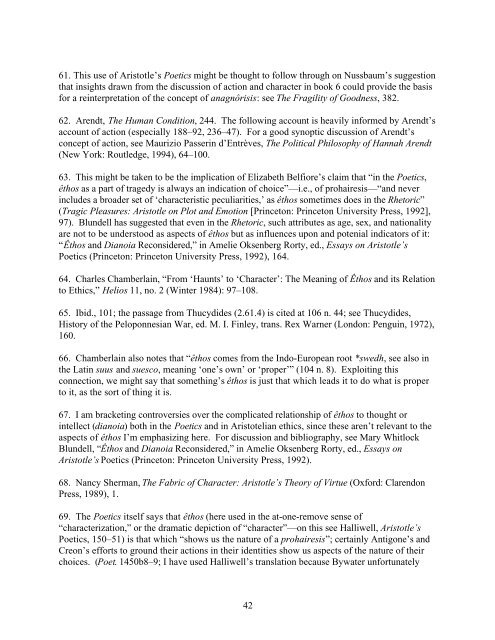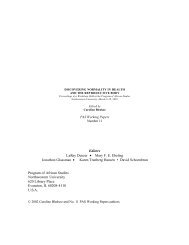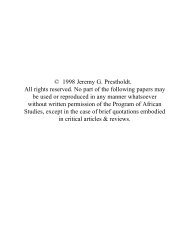TRAGIC RECOGNITION: ACTION AND IDENTITY IN ANTIGONE ...
TRAGIC RECOGNITION: ACTION AND IDENTITY IN ANTIGONE ...
TRAGIC RECOGNITION: ACTION AND IDENTITY IN ANTIGONE ...
You also want an ePaper? Increase the reach of your titles
YUMPU automatically turns print PDFs into web optimized ePapers that Google loves.
61. This use of Aristotle’s Poetics might be thought to follow through on Nussbaum’s suggestion<br />
that insights drawn from the discussion of action and character in book 6 could provide the basis<br />
for a reinterpretation of the concept of anagnôrisis: see The Fragility of Goodness, 382.<br />
62. Arendt, The Human Condition, 244. The following account is heavily informed by Arendt’s<br />
account of action (especially 188–92, 236–47). For a good synoptic discussion of Arendt’s<br />
concept of action, see Maurizio Passerin d’Entrèves, The Political Philosophy of Hannah Arendt<br />
(New York: Routledge, 1994), 64–100.<br />
63. This might be taken to be the implication of Elizabeth Belfiore’s claim that “in the Poetics,<br />
êthos as a part of tragedy is always an indication of choice”—i.e., of prohairesis—“and never<br />
includes a broader set of ‘characteristic peculiarities,’ as êthos sometimes does in the Rhetoric”<br />
(Tragic Pleasures: Aristotle on Plot and Emotion [Princeton: Princeton University Press, 1992],<br />
97). Blundell has suggested that even in the Rhetoric, such attributes as age, sex, and nationality<br />
are not to be understood as aspects of êthos but as influences upon and potenial indicators of it:<br />
“Êthos and Dianoia Reconsidered,” in Amelie Oksenberg Rorty, ed., Essays on Aristotle’s<br />
Poetics (Princeton: Princeton University Press, 1992), 164.<br />
64. Charles Chamberlain, “From ‘Haunts’ to ‘Character’: The Meaning of Êthos and its Relation<br />
to Ethics,” Helios 11, no. 2 (Winter 1984): 97–108.<br />
65. Ibid., 101; the passage from Thucydides (2.61.4) is cited at 106 n. 44; see Thucydides,<br />
History of the Peloponnesian War, ed. M. I. Finley, trans. Rex Warner (London: Penguin, 1972),<br />
160.<br />
66. Chamberlain also notes that “êthos comes from the Indo-European root *swedh, see also in<br />
the Latin suus and suesco, meaning ‘one’s own’ or ‘proper’” (104 n. 8). Exploiting this<br />
connection, we might say that something’s êthos is just that which leads it to do what is proper<br />
to it, as the sort of thing it is.<br />
67. I am bracketing controversies over the complicated relationship of êthos to thought or<br />
intellect (dianoia) both in the Poetics and in Aristotelian ethics, since these aren’t relevant to the<br />
aspects of êthos I’m emphasizing here. For discussion and bibliography, see Mary Whitlock<br />
Blundell, “Êthos and Dianoia Reconsidered,” in Amelie Oksenberg Rorty, ed., Essays on<br />
Aristotle’s Poetics (Princeton: Princeton University Press, 1992).<br />
68. Nancy Sherman, The Fabric of Character: Aristotle’s Theory of Virtue (Oxford: Clarendon<br />
Press, 1989), 1.<br />
69. The Poetics itself says that êthos (here used in the at-one-remove sense of<br />
“characterization,” or the dramatic depiction of “character”—on this see Halliwell, Aristotle’s<br />
Poetics, 150–51) is that which “shows us the nature of a prohairesis”; certainly Antigone’s and<br />
Creon’s efforts to ground their actions in their identities show us aspects of the nature of their<br />
choices. (Poet. 1450b8–9; I have used Halliwell’s translation because Bywater unfortunately<br />
42














